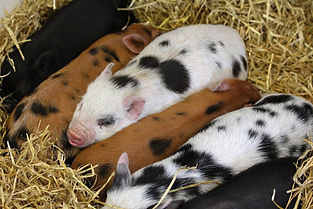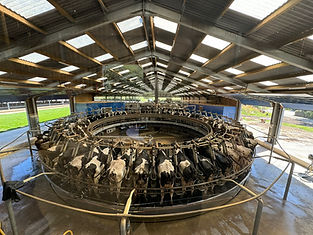Our 2025 Studentships
Student Applications are now open.
Application Deadline: Friday 2nd May at 12pm (BST)
We are delighted to announce our fully-funded, four-year PhD studentships in the application of Artificial Intelligence to sustainable agri-food, to start in October 2025.
Explore the projects in more detail below. If you would like to submit an application, please visit our 'How to Apply' page.
Assigned Projects

Dr Roslyn Henry, University of Aberdeen; Prof Georgios Leontidis, University of Aberdeen; Dr Mamatha Thota, University of Lincoln; Prof Jonathan Hillier & Dr Milad Toolabi, Trinity AgTech
This project aims to develop precise tools for monitoring biodiversity, enhancing sustainability and conservation efforts in agricultural landscapes. The objectives are to 1) develop deep learning methods for high-resolution landscape mapping using Earth Observation data; 2) implement biodiversity models using deep learning to monitor biodiversity changes on farms over time and 3) integrate high-resolution landscape and biodiversity maps into Trinity AgTech's natural capital navigator, 'Sandy'. Read more.

Dr Arran Hodgkinson, Queen's University Belfast; Prof Ilias Kyriazakis, Queen’s University Belfast; Dr Mingjun Zhong, University of Aberdeen; Agri-Food and Biosciences Institute
Machine learning (ML) is an invaluable modern technique whose insights, leveraged against large-scale databases tracking agricultural practices and outcomes, could radically change farming practices, both to the benefit of livestock and farmers, alike. Read more.

Dr Linda Oyama, Queen's University Belfast; Dr Mingjun Zhong,University of Aberdeen; Prof Ilias Kyriazakis, Queen's University Belfast; Dr Sadie Douglas, AB Neo
This project will utilise AI, including Bayesian models, to integrate and analyse data from controlled trials, manaement practices and microbiome sequencing. The goal is to better understand the interplay between dietary interventions, the gut microbiome, piglet weaning diarrhoea (PWD) and antimicrobial resistance (AMR). It aims to develop AI-driven strategies to enhance piglet health and mitigate AMR, collaborating with agri-food practitioners to co-create solutions that improve piglet welfare and farm productivity. Read more.

Prof Georgios Leontidis & Dr Aiden Durrant, University of Aberdeen; Dr Oorbessy Gaju, University of Lincoln; Dr Iain Place, Waterside Pharmaceuticals
The project aims to develop a crop-physiology-informed multimodal machine learning system to automate plant growth forecasting and health monitoring of medicinal cannabis production in controlled environment agriculture systems. Read more.


Prof Chris Creevey, Queen's University Belfast; Dr Robert Atkinson, University of Strathclyde
The overarching aim of this project is to apply explainable AI to extensive ruminant-associated microbiome data, in order to understand the ecological drivers of stable-state microbial communities linked to low emissions from the host. Read more.

Prof Craig Michie, University of Strathclyde; Prof Chris Creevey, Queen’s University Belfast; Dr Mazdak Salavati, SRUC
The project focuses on using artificial intelligence (AI) in the dairy sector to identify novel traits with strongest degrees of biological connection to Green House Gas (GHG) emissions from animals. Most dairy farms in the UK and around the world sample the milk on a regular basis for fat, protein, and spectral measurements. Read more.

Prof Vladimir Stankovic, University of Strathclyde; Dr Marta Dondini, University of Aberdeen; Prof Lina Stankovic, University of Strathclyde; RHD (Scotland) Ltd
The agri-sector, especially dairy farming, is a major contributor to greenhouse gas (GHG) emissions with 18% of annual worldwide GHG emissions attributed to animal farming. Understanding the variation in GHG emissions among different farming practices helps to identify sustainable approaches that reduce pollution. Read more.

Dr Robert Atkinson, University of Strathclyde; Dr Lan Qie, University of Lincoln; Prof Christos Tachtatzis, University of Strathclyde; Lactalis
Satellite Earth Observation (EO) Data has emerged as a game-changer in accurately assessing plant biodiversity and ecosystem functions within agricultural landscapes, spanning both grassland and arable terrains. Read more.

Harnessing AI Tools and DNA-based Monitoring to Enhance Arthropod Biodiversity Assessments
Dr Karen Siu Ting, Queen's University Belfast; Prof Christos Tachtatzis, University of Strathclyde; Dr Neil Warnock, Dr Florentine Spaans and Dr Michael Stevenson, Agri-Food and Biosciences Institute (AFBI).
Arthropods are vital for forest ecosystems, but their populations are being threatened by habitat disturbances, climate change and invasive species. This project uses AI and DNA metabarcoding to improve biodiversity assessments in Northern Ireland's commercial forests. The student will analyse samples, develop identification tools, and receive training in AI, molecular techniques, and data management, preparing for careers in data science and ecology.
Read More

Clear and sound: combining image analysis and bioacoustics to link pollinators traffic with fruit set and harvest
Dr Fabio Manfredini, University of Aberdeen; Dr James Windmill, University of Strathclyde; Prof Georgios Leontidis, University of Aberdeen; Casey Woodward, AgriSound Ltd.
Insect pollinators, especially bees, are crucial for ecosystem services and crop pollination. This project uses camera and acoustic monitoring to study pollinator-flower interactions and colony activity. Data will be analysed with machine learning to understand how colony traffic affects flower visitation rates and how these two measures impact on fruit set and harvest, providing interdisciplinary training in ecology, bioacoustics, and data analysis.
Read More

AI for the Decarbonisation of the Dairy Sector: Heat Recovery and Energy Harvesting
Prof Lina Stankovic, University of Strathclyde; Dr Sean Cullen, Queen's University Belfast; Richard Hey, RHD Scotland Ltd
The project’s aim is to develop AI-driven methodologies to reduce the GHG emissions of dairy farms. The proposed research will design and implement an AI-based energy management system within farms, mitigating waste due to malfunctioning equipment, and enabling waste heat recovery and thermal storage that can be used to heat sheds, water for disinfection of plants etc.
Read More

Multi-Object Visual Tracking (MOT) of Animals in Agriculture
Dr Niall McLaughlin, Queen’s University Belfast; Dr Christos Tachtatzis, University of Strathclyde; Prof Ilias Kyriazakis, Queen's University Belfast; Zoetis.
This project aims to improve the performance of artificial intelligence-based video analytics in agriculture by developing and applying novel methods for Multi-Object Visual Tracking (MOT). Computer vision, video analytics, and AI can help monitor and improve animal welfare while improving farm productivity.
Read More

A Machine Learning Accelerated Spectral Matching Algorithm to Identify Harmful Algal Blooms and Other Threats to Aquaculture Operations.
Dr David McKee, University of Strathclyde; Prof Paulo A. Prodöhl, Queen's University Belfast; Dr Claire Neil, Scottish Environmental Protection Agency
This project aims to revolutionise water quality monitoring in aquaculture environments by combining optical oceanography and genomics. By integrating remote sensing data with genetic material analysis, it will enhance early warning systems for harmful algal blooms (HABs) and other threats like microjellyfish. This approach will allow for more precise detection and prediction of HAB events, which is crucial for effective aquaculture management.
Read More


